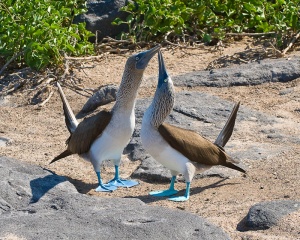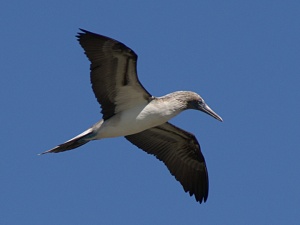- Sula nebouxii
Identification
L. 32-34" (81-86 cm)
- Long, pointed bill, wings and tail
- Pale head and neck, streaked brown
- Dark brown wings
- White patches on nape and rump
- Mantle barred with thin, white lines
- Mostly white tail with dark corners on upperside
- Brown below
- Underparts white
- White armpits
- Two pale bars on underwing
- Bright blue legs and feet
- Gray bill
Immature: Darker overall with darker bill and duller feet.
Similar Species
Brown Booby lacks white patches on nape and rump; its feet are yellow or greenish yellow.
Distribution
The pacific coast of Mexico to Peru and Galápagos Islands.
Taxonomy
Subspecies nebouxii is found along the pacific coast of Mexico to Peru, while excisa belongs in Galapagos.
Habitat
Open Sea but also quite often near coast in shallow waters, and may even occur as a visitor in inland waters.
Behaviour
Flight
Boobies fly fairly high over the ocean with steady, rapid, even strokes, followed by a short glide.
Diet
Feeding: When fishing, Blue-footed Boobies plunge headlong into the water with wings partly folded after a cirkling motion; they sometimes snatch flying-fish out of the air. Often in groups when fishing.
Breeding
Usually nests in colonies on islands or isolated cliffs where 2 or 3 chalky pale blue or green eggs laid on the ground.
Vocalisation
Usually silent; trumpeting and whistling noises on breeding grounds.
References
- Clements, JF. 2009. The Clements Checklist of Birds of the World. 6th ed., with updates to December 2009. Ithaca: Cornell Univ. Press. ISBN 978-0801445019.
Recommended Citation
- BirdForum Opus contributors. (2024) Blue-footed Booby. In: BirdForum, the forum for wild birds and birding. Retrieved 12 June 2024 from https://www.birdforum.net/opus/Blue-footed_Booby







